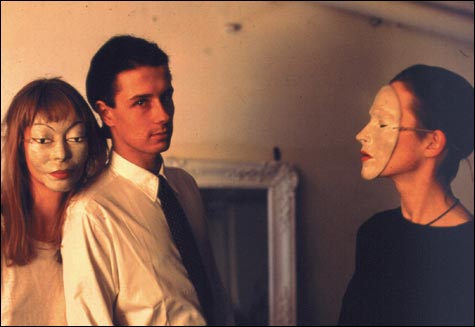
RUTH: The standout tracks from the land that gave us “Je t’aime” are, no surprise, male/female duets. |
There’s scant digital evidence that one Tona Omaha exists or ever existed: he has one on-line mastering credit on a 1996 disc of guitar instrumentals. But in the analog realm, he lives on. Omaha’s seven-inch single “T.V.” dates from 1983, when synthesizers had become affordable home-studio additions but were still novel enough to signify “the future.” Assembled “in one evening with an Oberheim DMX synched to a Korg Polysix Arpeggiator,” as the liner notes to the new The Found Tapes report, the track’s sequenced bass line and virtual drums are as much of their time as its video-age anomie. “Film clip — update — this shit — tastes great. Ha-ha-ha,” Omaha barks. By comparison, Gary Numan would sound like a model of humanist warmth.
“T.V.” is a highlight of The Found Tapes, a compilation on Brooklyn’s Minimal Wave label, which specializes in vinyl-only reissues of late-’70s-to-mid-’80s synth-rock obscurities. (This comp’s biggest names are Philadelphia’s Crash Course in Science, known for their appearances on the New York/New Jersey–only The Uncle Floyd Show, and Robin Crutchfield’s post-DNA project Dark Day.) “Minimal wave” seems to be the label’s after-the-fact genre designation, covering everything from automated quasi-funk to arrhythmic assemblage. Most of the music, though, shares one distinctive feature: because so many of the available instruments were monophonic, the songs tend to be built from interlocking — and naggingly catchy — keyboard lines rather than the chordal riffs common to much guitar-based music.
Not every selection here transcends its moment. Deo Toy’s “Love Me or Leave Me” merely demonstrates that an unimaginative love song remains so however it’s arranged. And Craig Sibley’s “You See Art, I See Clay” doesn’t live up to its promisingly MFA-damaged title. But for every duff track, there’s a silicon nugget: the moody sweep of Mark Lane’s “Who’s Really Listening?” or Iron Curtain’s “The Condos” would fit snugly on an early OMD album.
The Found Tapes surveys the North American scene; an earlier compilation (The Lost Tapes) did the same for like-minded European artists. Further evidence of the genre’s international profile comes by way of BIPPP: French Synth-Wave 1979–1985 (Everloving). (No one’s quite sure what to call this stuff — you also find the term “coldwave” applied to its goth variants — but all parties agree that there’s a wave involved.)
It’s at once apparent that many of these groups took technological imperatives less to heart than their Anglo counterparts. Several human rhythm sections appear among the automated ones, with Casino Music’s “Viol AF 015” having a particularly satisfying bottom-heavy, AOR feel. Guitars aren’t interdit either: Act’s “Ping Pong” starts as Zombies-style 12-string psych-pop, replete with the violent stereo panning its title suggests, before the inevitable lead-keyboard hook kicks in. Non-Francophiles won’t be able to diagnose the exact psychosocial dysfunctions conveyed by these songs, but it often doesn’t matter. Once you’ve grasped the title of the Comix’s “Touche pas mon sexe” (“Don’t touch my sex”), their singer’s Howard-Devoto-in-aversion-therapy yelps are tough to misinterpret.